The Quarantined Country Musician
Undaunted by masks, social distancing, and sheltering-in-place orders, North Carolina’s Jonathan Byrd continues to draw large audiences to his virtual performances.
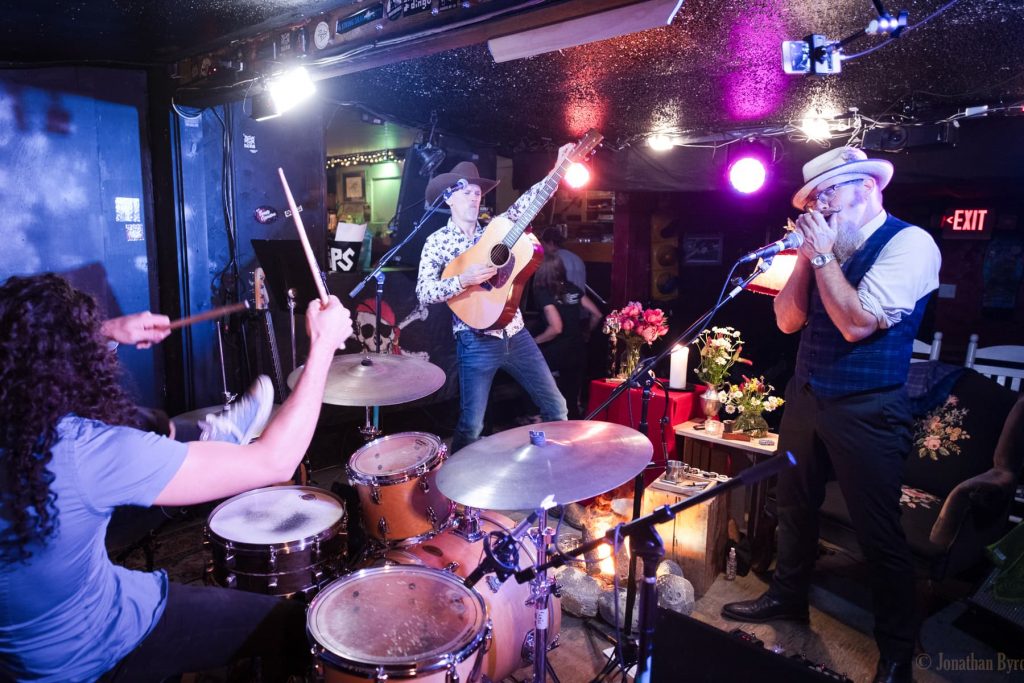
For more than 20 years, Jonathan Byrd has written and performed country and old-timey, flat-picking folk and rock ‘n roll, most recently at The Kraken, one of the diviest of North Carolina’s dive bars. Back when the performances were live, Wednesday nights, to the hundreds of fans who squeezed in right up to the plywood stage, were like church and an unselfconscious community gathering rolled into one. The audience sang along, arms waving, unable to keep still.
Now those fans and hundreds of others listen from home, hitting likes and hearts online, typing in comments, throwing tips via Venmo and PayPal, dancing and singing along in kitchens and living rooms all over the world. “I like people who dance,” Byrd says. “It’s like they’re listening with their whole body.”
This April, Byrd parodied the Johnny Cash classic “I’ve Been Everywhere.” He rewrote the lyrics as a Covid edition, going “everywhere” within the footprint of his own house. By late May, the video had already gathered more than 50,000 viewers.
At a time when most musicians struggle, Byrd and his band are getting 1,000 times as many tips each week performing online. (“It’s not 1,000 times more money,” Byrd says, “but it’s definitely more money.”) They do it not just by making great music, although there’s that, but by creating an authentic American experience.
“People in Germany want to hear American music,” Byrd says. “People in Denmark want to see a real American roadhouse and a real American country band, and there we are. Plus, it’s hard to get a better set than The Kraken. It’s like a Quentin Tarantino movie with the pirate flags, the cables hanging down. Everything is a feast for the eyes.”
The Kraken, which sits down a country road west of the small town of Carrboro, has sometimes been a biker bar. At times it’s been dangerous. The building is beat up, but when Byrd is playing, your biggest risk, even before COVID, was being hugged. Behind Byrd is a rubber saguaro cactus in front of a model of the moon made by Byrd (with polyester quilt batting, a foam core, and black paint). There’s a state flag on the wall and, in the middle of the stage, a faux fire, with a dapper man in a fedora pulling wails from a musical saw. Overhead is a fan-made sign that reads This Is Paradise.
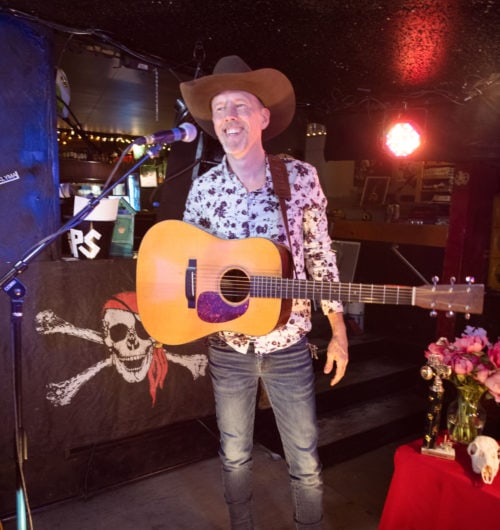
“It’s not exactly the Taj Mahal, but it’s our little club house.”
Byrd, 50, is the image of an urban cowboy. Tall and thin with a bony face, he dresses in flowered button downs and skinny jeans, Frye boots, and a large, dark brown cowboy hat. His long-time band mate, Johnny Waken, also 50, leans to the natty (three-piece suit, a pocket square expertly tucked, his beard in a rubber-banded point). Waken switches back and forth from electric violin to bass and guitar, and for a treat, to the screaming musical saw that he plays with eyes closed, waxed mustache aimed at the ceiling. Drummer Austin McCall, 35, who performs in a Senegalese band on the side, occasionally slides out from behind his kit, long black ringlets flying, to sing harmony. Sitting between them is a shrine of candles and flowers for long-time bandmate Paul Ford, who died in 2015 of a brain tumor.
Now that the live audience is gone, the musicians have adapted. “Instead of looking out at this weird empty room of chairs stacked up and cleaning products,” Byrd says, “we turned to face Austin and put a campfire in the middle of us, so we are each other’s audience, which somehow makes it easier for us to play for the audience that’s not there.”
So the trio instead plays to the cameras. A few are fixed in place, but there are also cell phones on gimbals handled by photographers dressed like robbers, in masks and caps and goggles due to the coronavirus. They zoom in tight on Johnnie’s hand picking, or over McCall’s shoulder to film his drumming.
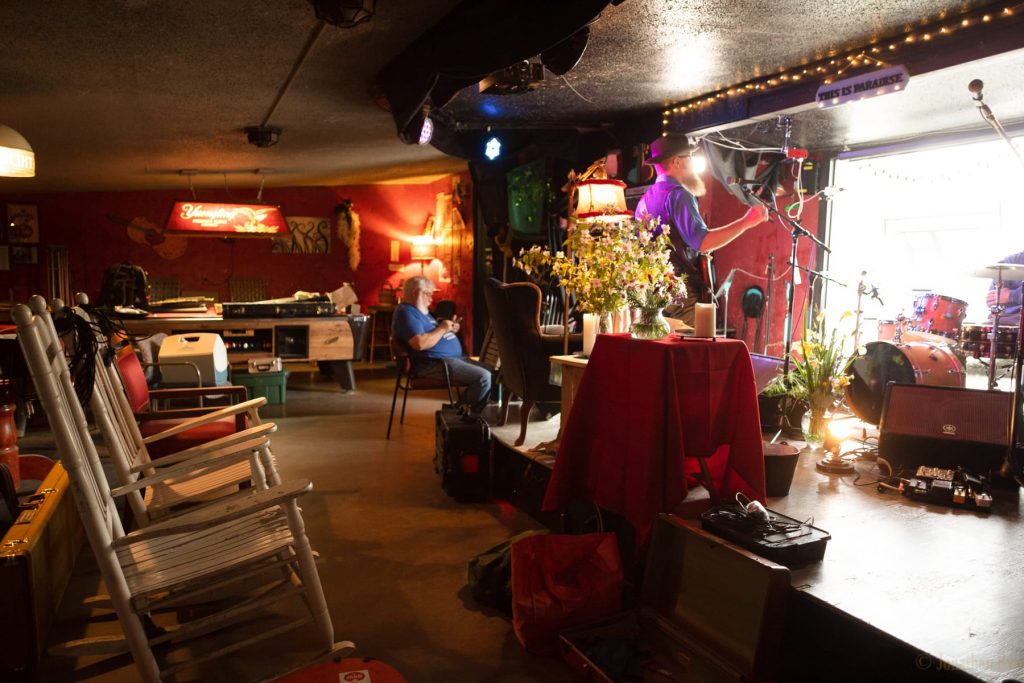
“I told the camera people, you don’t want to be as if the audience is paraplegic and can’t walk to the stage,” Waken says. “Let’s do some crazy shots and make it fun.”
The band’s act at The Kraken began in 2018, when Byrd saw that on Wednesdays the shack-like bar sat nearly empty. Maybe a pickup truck in the lot, maybe a Harley. “Hey,” he said to the owners, “how about if I play a regular weekly gig here?” Thus, the Shake Sugaree Americana Residency was born, first with no chairs and a random customer dropping in for a beer, then with people putting out folding chairs and then dragging in more chairs. Before long, fans started arriving at 6 p.m., an hour before the show was to begin, to set them all up and claim their spot.
“They gave us a parade!” Byrd says. “I cried! How much love, what a beautiful thing that was!”
The act never had a cover charge. The goal was to have a paid rehearsal and maybe create an experience. But because there was no cover there was a lot of serendipity. The farmer or second shift worker who wouldn’t have come in with a cover would drop by to get a beer, hear the band, like the music, toss a twenty into the bucket, and come out week after week. “We lost that $20 at the door but we got $2,000 in the bucket over the years,” Byrd says.
From early on, Byrd played for fans online—the guy at home with a sick dog, another recovering from a heart bypass, or someone who had moved to the other side of the world. After buying a camera and studying YouTube, he mounted phones in corners during live shows. On breaks he’d hear from his fans that the image was upside down, the music didn’t synch. Over time, he honed his virtual performance skills.
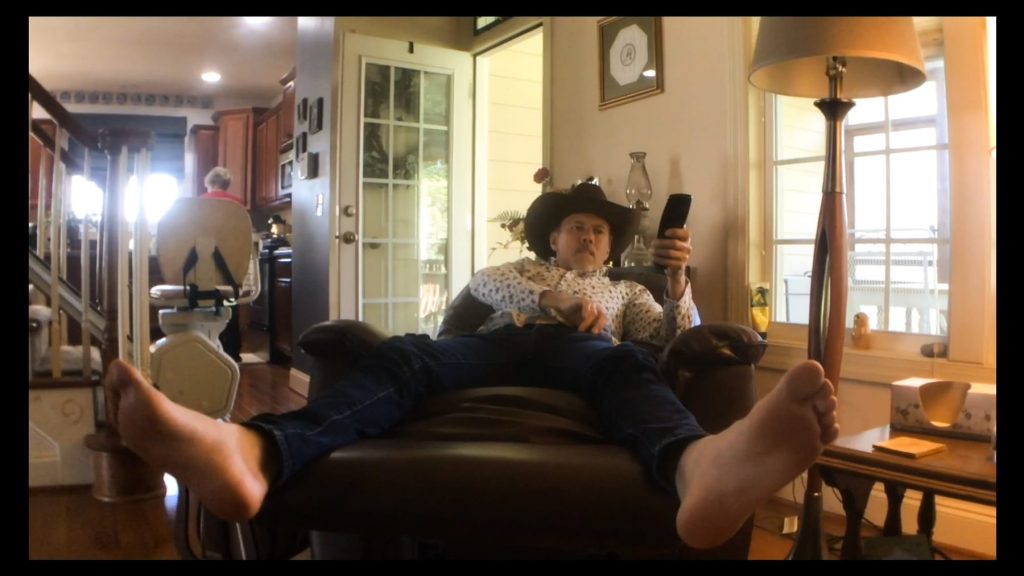
“They were ahead of the game because they started this video streaming before everything shut down,” says Monica Ferrell, a long-time fan. She and her husband, James Morgan, who haven’t missed a Wednesday night in years, watch the YouTube version on their TV while logging on to the Facebook feed on their phones so they can comment as they sing and dance together in their living room.
The couple is among a stream of socially distanced fans who drove, honking and waving, past the Kraken one Wednesday, their cars festooned with banners printed on poster board and paper bags saying “We Love Our Cowboys!” and “Thank you for the Music!”
“They gave us a parade!” Byrd says. “I cried! How much love, what a beautiful thing that was!”
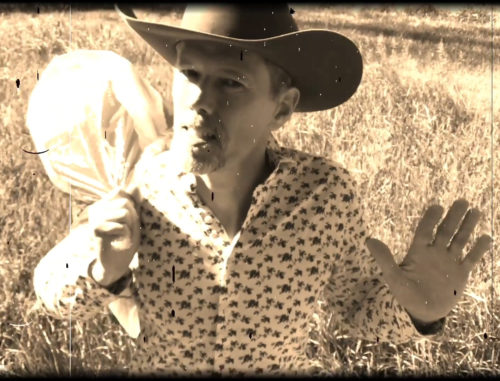
Between sets the band showcases up-and-coming artists or runs videos that Waken produces—of himself meticulously tapping tobacco into his crook-necked pipe; of slides of Byrd’s other profession – photography; of the Waken way to build a campfire, with just flint and tinder; all with music from Byrd’s early albums in the background. In early April, Waken and Byrd produced a delightful parody of the Johnny Cash classic “I’ve Been Everywhere.” Byrd rewrote the lyrics as a kind of Covid edition, with Byrd going “everywhere” within the footprint of his own house—walking from the kitchen to the bedroom to the foyer to the porch, even sitting on the can, pants around ankles, much of it filmed with a selfie stick and a wide-angle lens.
“Johnny did all of the editing, put the whole thing together on an ipod touch the size of a credit card,” Byrd says. “We are living in the future.”
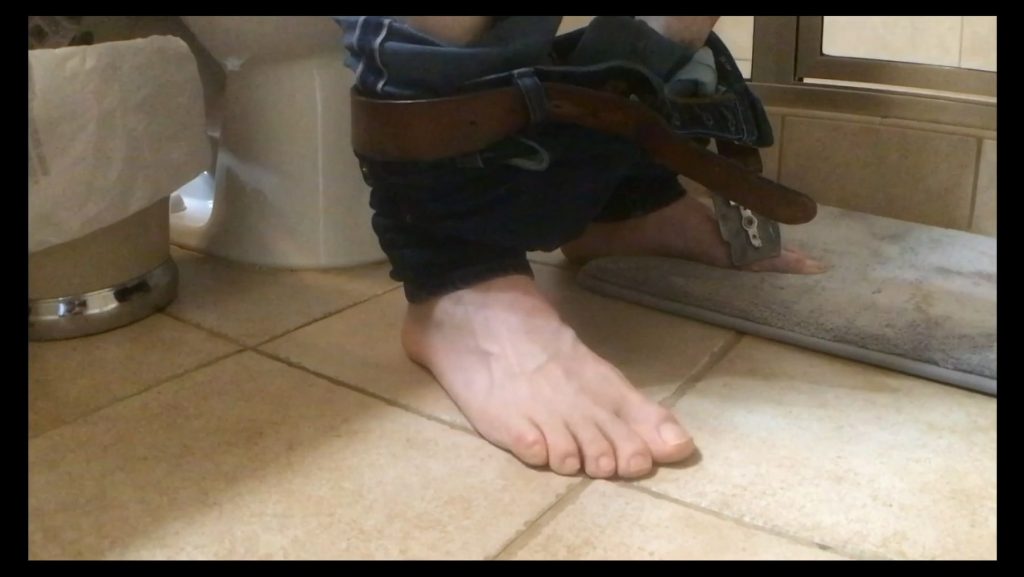
The video, which jokingly claims to be by Tentin Quarantino, begins with Byrd strolling down a country road, a jumbo pack of toilet paper over his shoulder, singing “I was toting my pack along a dusty Cackalacky road, when along came a semi with a hand sanitizer load…” As of late May, it had been viewed more than 50,000 times and Byrd has released the track and the lyrics on Bandcamp and is donating 100 percent of the profit to the WHO Covid-19 Response Fund.
This kind of generosity is standard for Byrd. On the one-year anniversary of his residency at The Kraken, he auctioned off the inaugural playlist for $100, to be donated to a local food bank; at Christmas he collects toilet paper and tampons for the food bank’s shelves. When he learned that his girlfriend’s daughter’s boarding school, which serves deaf children, didn’t have much to do in the evening, he sent an email to his fans asking for help. The following Wednesday, he drove away from his show with a truck bed full of books, puzzles, games and DVDs. He also raised $1,000 when he learned the school had no art supplies. On Memorial Day, he paid his band and then donated the rest of their tips to the National Coalition for the Homeless, in honor of the 400,000 veterans who experience homelessness in any given year.
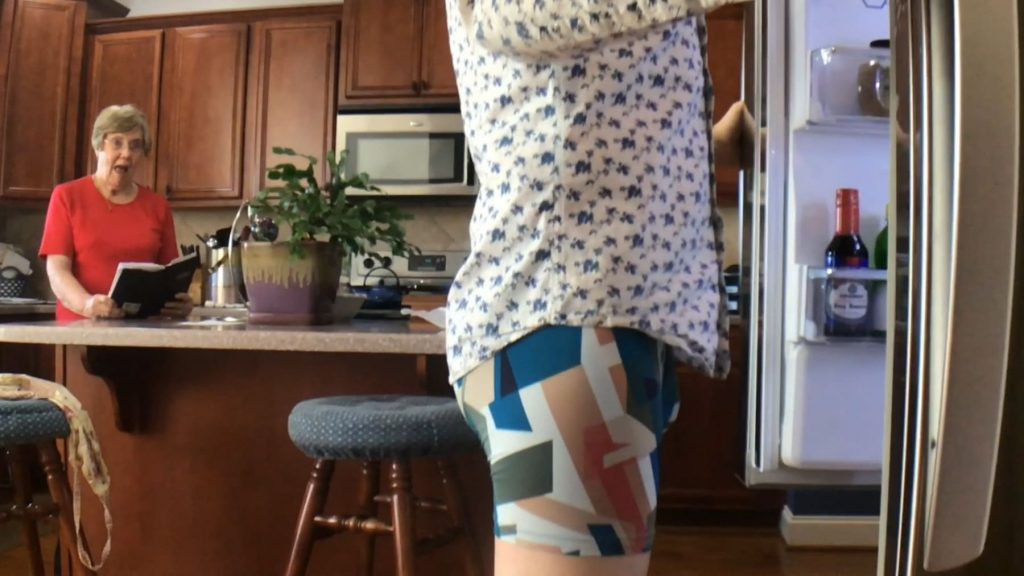
“I think paying lip service to the dead is bullshit unless we care for the living,” Byrd wrote to his fans.
Now, with his community online, there’s no audience to chat up after the show. He just breaks down his gear and goes home. But he still tends to his audience via comments threads, answering questions, giving thumbs up, sending special wishes to people he knows are struggling in isolation.
In keeping with his no-cover policy, there’s no paywall on Byrd’s offerings–not with 20 million American unemployed, he says. “If we can’t physically touch each other right now, at least we can emotionally, spiritually… we can exchange our stories, we can support each other.”
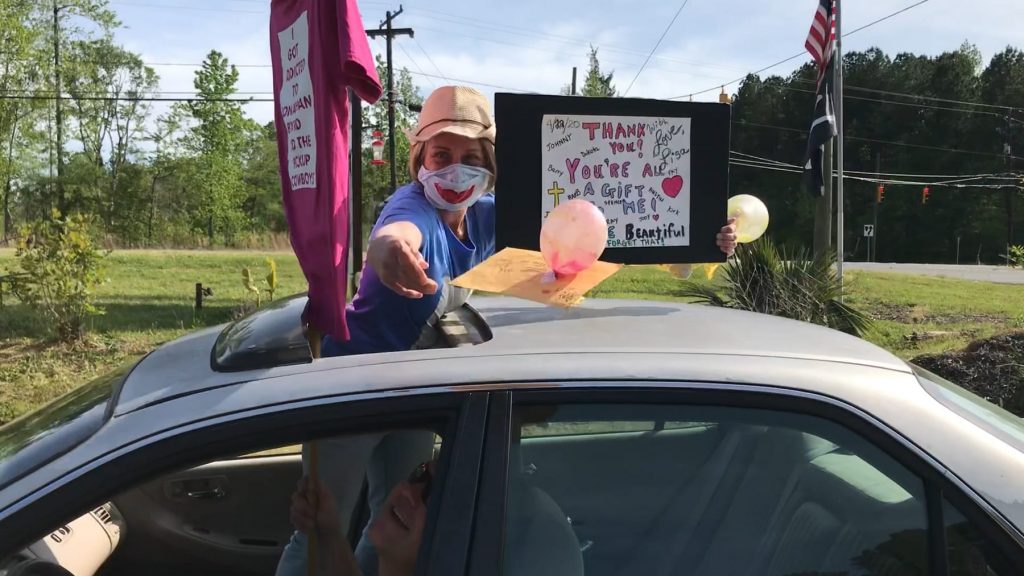
Obviously, making music this way can feel odd. There are no applause or hoots and whistles at the end of each song. Waken can’t climb out into the audience as he used to, and play his electric riffs nearly from someone’s lap. People don’t buy CDs (whose car has a CD player now?), and t-shirts are no longer an impulse buy, a souvenir of a memorable night. Byrd was in the midst of printing new shirts just when the pandemic hit, so he adapted, designing one that reads “Global Pandemic Tour 2020” over a lyric from one of his songs, “Loneliness is Poverty.”
“One of the most powerful things you can do is to sing and to dance,” he says to the camera, during one of the band’s online performances, as Waken and McCall keep up a soft rift behind him. “Maybe you dance in your shower, or in your car, and maybe people look at you funny.” Byrd looks down at his guitar, plays a lick, looks back up. “Dance anyway.” And with that, he breaks into another song.
